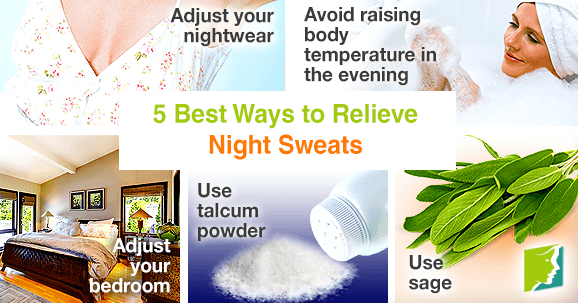For a woman in her 40s, 50s, or 60s, waking up during the night to find herself coated with cold sweat is normally an indicator of menopause. Hormonal changes in the body during these years cause the body to detect increased body temperature and then try to cool down by sweating excessively. Nocturnal hyperhidrosis, or night sweats, is unpleasant and can be detrimental to getting a good night's sleep. If unaddressed, regular sweating episodes may lead to fatigue. There are a number of methods you can utilize to relieve night sweats naturally.
Adjust Your Nightwear
Wearing clingy nightwear in synthetic materials (e.g., lace and silk) restricts air access to the skin, which makes an increase in body temperature and consequential sweating more likely while you sleep. They can also cause a feeling of clamminess, as these fabrics do not allow sweat to evaporate from the skin. Opt for loose cotton nightwear or sleep naked to enable air to access the skin while you sleep and keep you cool.
Avoid Raising Body Temperature in the Evening
Stimulating activities and foods can increase body temperature, so these should be avoided in the evening to prevent resultant night sweating episodes. Alcohol, caffeine, and spicy foods should not be consumed at night for this reason, and hot baths or showers should not be taken. Similarly, while exercising can help regulate many menopause symptoms - including night sweats - it is best to work out earlier in the day. This is because exercise causes a prolonged increased body temperature that can trigger sweating.
Adjust Your Bedroom
This may seem obvious, but keeping your bedroom cool will help your body to maintain a consistent internal temperature during the night. Try keeping a window open for ventilation, and avoid heaping heavy blankets on the bed or using central heating. If you are cold, opt for layers of cotton sheets, which are breathable and can be easily kicked off if you feel too warm.
Use Talcum Powder
Talcum power has astringent properties that cause skin tissues to constrict and create a drier surface. Dabbing talc over sweat prone areas - not on wet skin - could therefore help deter sweating during the night. Talc is also absorptive and fragrant, which helps to prevent clamminess and body odor.
Use Sage
Sage has significant sweat-relieving properties, so aim to work the herb into your evening routine in some way. This could involve drinking cooled sage tea, using the herb to season your evening meal, or creating a cool sage poultice to put over sweat prone areas before going to sleep.
It is important to be aware of personal hygiene while you are taking steps to relieve night sweats so that your personal and professional lives are not affected by body odor. Take particular attention to sweat-prone areas when you wash, and remember to use antiperspirant. Night sweating does not have to stand in the way of you getting a good night's sleep; minor adjustments to your evening routine are a small sacrifice to make for the sake of your well-being.
Sources
- Better Health Channel. (2013). Sweat. Retrieved February 20, 2014, from http://www.betterhealth.vic.gov.au/bhcv2/bhcarticles.nsf/pages/Sweat_explained
- Dall, L. & Stanford, J.F. (n.cd). Fever, Chills, and Night Sweats. In: Clinical Methods: The History, Physical, and Laboratory Examinations. 3rd ed. Retrieved from http://www.ncbi.nlm.nih.gov/books/NBK324/
- Stanford University. (1998). Sleep Hyperhidrosis. Retrieved February 20, 2014, from http://www.stanford.edu/~dement/sweats.html




